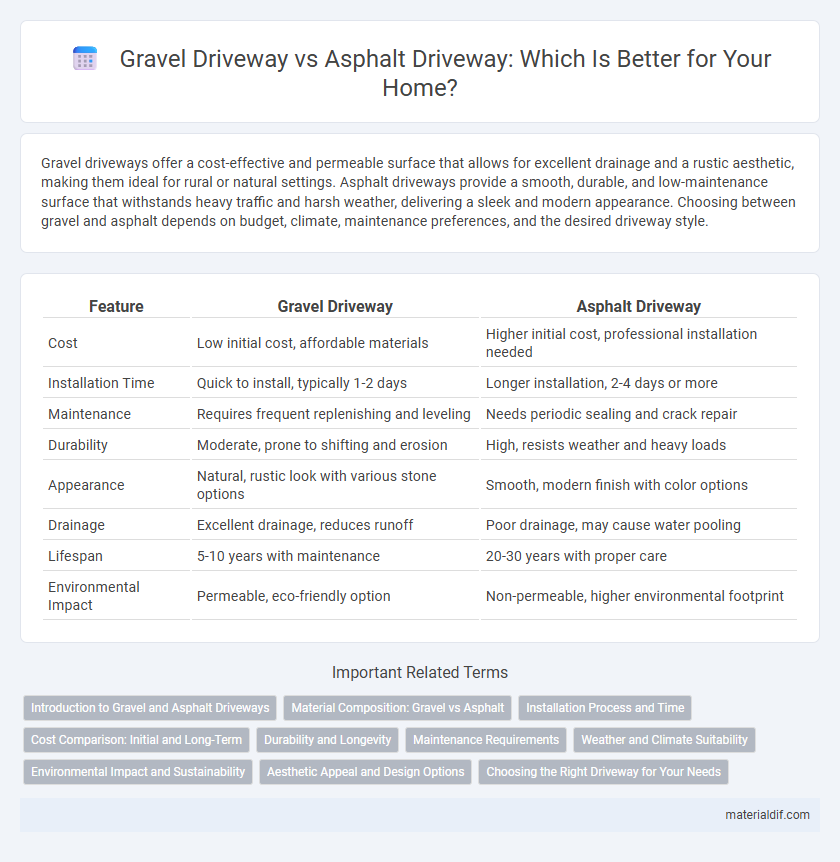Gravel driveways offer a cost-effective and permeable surface that allows for excellent drainage and a rustic aesthetic, making them ideal for rural or natural settings. Asphalt driveways provide a smooth, durable, and low-maintenance surface that withstands heavy traffic and harsh weather, delivering a sleek and modern appearance. Choosing between gravel and asphalt depends on budget, climate, maintenance preferences, and the desired driveway style.
Table of Comparison
| Feature | Gravel Driveway | Asphalt Driveway |
|---|---|---|
| Cost | Low initial cost, affordable materials | Higher initial cost, professional installation needed |
| Installation Time | Quick to install, typically 1-2 days | Longer installation, 2-4 days or more |
| Maintenance | Requires frequent replenishing and leveling | Needs periodic sealing and crack repair |
| Durability | Moderate, prone to shifting and erosion | High, resists weather and heavy loads |
| Appearance | Natural, rustic look with various stone options | Smooth, modern finish with color options |
| Drainage | Excellent drainage, reduces runoff | Poor drainage, may cause water pooling |
| Lifespan | 5-10 years with maintenance | 20-30 years with proper care |
| Environmental Impact | Permeable, eco-friendly option | Non-permeable, higher environmental footprint |
Introduction to Gravel and Asphalt Driveways
Gravel driveways consist of loose stones that provide excellent drainage and a rustic appearance, often favored for their affordability and ease of installation. Asphalt driveways offer a smooth, durable surface with a sleek finish, capable of withstanding heavy traffic and harsh weather conditions. Choosing between gravel and asphalt involves considering factors such as maintenance requirements, cost, and aesthetic preferences specific to residential or commercial properties.
Material Composition: Gravel vs Asphalt
Gravel driveways consist of natural stones, including limestone, granite, or quartz, offering excellent drainage and a rustic aesthetic. Asphalt driveways are composed of bitumen mixed with aggregates like sand, crushed stone, and gravel, providing a smooth, durable, and weather-resistant surface. The porous nature of gravel helps with water runoff, while asphalt's dense formula ensures long-lasting strength and easy maintenance.
Installation Process and Time
Gravel driveways offer a straightforward installation process, typically requiring minimal site preparation and can be completed within a day. Asphalt driveways involve more complex steps, including grading, laying multiple layers, and proper curing time, often taking several days to finish. The quicker installation of gravel driveways makes them a cost-effective choice for homeowners seeking rapid project completion.
Cost Comparison: Initial and Long-Term
Gravel driveways typically have a lower initial cost, ranging from $1 to $3 per square foot, compared to asphalt driveways which cost between $3 and $7 per square foot. Maintenance expenses for gravel, such as grading and replenishing stones, are generally moderate but recurring, while asphalt requires sealing every 2-3 years at approximately $0.14 to $0.20 per square foot to prevent cracks and extend longevity. Over a 10-year period, gravel may offer better savings if regular upkeep is manageable, whereas asphalt provides a smoother surface with higher upfront costs and maintenance investments.
Durability and Longevity
Gravel driveways offer excellent durability with proper maintenance, resisting cracks and damage from freeze-thaw cycles better than asphalt. Asphalt driveways provide a smoother surface but are prone to cracking and require seal coating every few years to maintain longevity. Gravel surfaces typically last 15-20 years, while asphalt driveways average 20-30 years, depending on climate and upkeep.
Maintenance Requirements
Gravel driveways require regular maintenance such as grading, adding new gravel, and weed control to prevent erosion and maintain surface integrity. Asphalt driveways demand periodic sealing, crack filling, and resurfacing to avoid water damage and extend lifespan. Gravel maintenance is generally less costly but more frequent, while asphalt requires less frequent yet more specialized upkeep.
Weather and Climate Suitability
Gravel driveways excel in regions with heavy rainfall or freezing temperatures as they provide excellent drainage and resist cracking caused by frost heave. Asphalt driveways perform better in hot climates due to their smooth surface and heat absorption, but they may soften or deform in extreme heat. Choosing between gravel and asphalt should consider the local weather patterns to ensure durability and long-term maintenance efficiency.
Environmental Impact and Sustainability
Gravel driveways offer superior environmental benefits due to their permeability, which allows rainwater to seep into the ground, reducing runoff and erosion compared to impermeable asphalt surfaces. Gravel is typically made from natural, locally sourced materials, minimizing carbon emissions associated with production and transportation, whereas asphalt relies heavily on petroleum products. Over time, gravel driveways require less energy-intensive maintenance and can be easily recycled, making them a more sustainable choice for eco-conscious homeowners.
Aesthetic Appeal and Design Options
Gravel driveways offer a rustic and natural aesthetic with a range of color options and textures, creating a customizable look that blends well with various landscape styles. Asphalt driveways provide a clean, smooth, and modern appearance, available mainly in black or dark tones, enhancing curb appeal with a sleek finish. Gravel allows for flexible shapes and easy expansion, while asphalt supports uniform design with sharp edges and a polished surface.
Choosing the Right Driveway for Your Needs
Gravel driveways offer excellent drainage, cost-effectiveness, and a rustic aesthetic ideal for rural properties or those seeking low-maintenance surfaces. Asphalt driveways provide durability, a smooth finish, and enhanced load-bearing capacity, making them suitable for high-traffic areas and urban settings. Considering factors such as budget, climate, vehicle frequency, and desired appearance helps determine the most appropriate driveway solution for your property.
Gravel Driveway vs Asphalt Driveway Infographic

 materialdif.com
materialdif.com